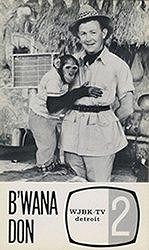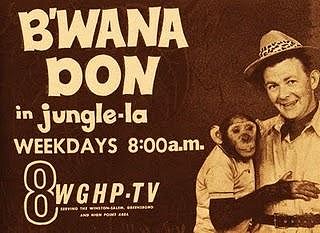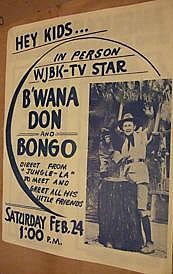Beyond Tiki, Bilge, and Test / Beyond Tiki
B'wana Don!
Pages: 1 1 replies
|
WD
White Devil
Posted
posted
on
Thu, Aug 25, 2011 5:29 AM
For many of us who were born in the late fifties/early sixties, our first taste of exotica came to us in the form of a black & white kid's show called "B'wana Don in Jungle-La." Something of a hybrid between "The Popeye Club" and Mutual of Omaha's "Wild Kingdom," B'wana Don's show featured his chimp Bongo Bailey, and was actually filmed in Kenya, where Don lives to this day. (See http://www.ferndalehistoricalsociety.org/people_hunt.html for more biographical material). Originally the show lasted for three years, but was later syndicated to more remote markets (in my case, Atlanta) in the early 'sixties. Though of African origination, I think B'wana Don more than deserves his plinth in the mid-century Hall of Heroes.
[ Edited by: White Devil 2011-08-25 06:26 ] |
|
WD
White Devil
Posted
posted
on
Thu, Aug 25, 2011 6:58 AM
"B'wana Don" was one of the last children's shows that featured social interaction with an adult (the host) and studio audience, in the mold of the previous generation's “Howdy Doody” and “Bozo the Clown.” Such shows overtly sought to enlighten and equip its young audience, as opposed to socializing/indoctrinating or outright emasculating it (see “Romper Room,” “Sesame Street,” “Mister Rogers' Neighborhood,” and the wave of 'seventies & 'eighties non-violent pap). Other programs of this era were the early Japanimation hits “8 Man,” and “Astro Boy,” “Mighty Mouse,” “Captain Kangaroo,” and an Atlanta-local production “Officer Don and the Popeye Club.” The latter featured early Fleischer “Popeye” cartoons sandwiched between in-studio hijinks such as “the ooey-gooey-bag:” a musical-chairs game featuring viscous ooze inside paper sandwich bags. Other Atlanta-market characters were “Officer Don’s…” Orville the Dragon hand-puppet, “Tubby & Lester” (a blatant Laurel & Hardy rip-off), and the inimitable Bestoink Dooley.
!uSathane omhlophe umthondo omkhulu! [ Edited by: White Devil 2011-08-25 09:39 ] |
Pages: 1 1 replies




